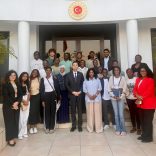Thousands fleeing Mozambique violence: UN
Saved by COVID from the “torture of love”: Survivors of child marriages tell their stories

Photo: Lusa
Fragile and shy, Vaida Raposo, 15, took advantage of the restrictions imposed by Covid-19 to break a family tradition and escape a premature marriage arranged by her uncles in Mondoguara, a poor village in the interior of Manica province, central Mozambique.
The man she lived with for four months was stranded in Zimbabwe in December due to the border closure, and the girl decided to seek help from the Community Child Protection Committee.
“He has now gone to Zimbabwe and because of the coronavirus he has not yet returned,” Vaida Raposo told Lusa, adding that she is “afraid of him coming back” and taking her.
That is why she is seeking intervention by the authorities, for her to be transferred to another area and allowed to dedicate herself to her studies.
The girl’s mother, a 34-year-old gold miner, was given in marriage to a man twice her age, and is now trying to prevent the same happening to her firstborn, so that she does not have to “live with unhappiness for the rest of her life”.
“I cannot allow the life I lived to be lived by my daughter. She must study and have a different kind of home,” says Cherit Matandira, who, along with other activists, is now fighting for the rights of her daughter and other girls at risk of similar “unions” in the village.
Vaida entered the lists of dozens of girls rescued in 2020 from premature marriages in four districts of Manica by Save The Children, a humanitarian organisation focused on child protection.
In total, 92 children were identified by 114 Community Child Protection Committees as being at risk of premature marriage in the Manica, Machaze, Macossa and Tambara districts. Forty-seven were rescued.
A further 13 girls were rescued by the organisation through the Fala Criança Line, supported by Norwegian development agency Norad.
Despite the success in the case of Vaida Raposo, the director of the Manica program at Save The Children, Ana Dulce Guizado, fears that “at the moment, Covid-19 is damping the awareness-raising” already achieved by the organisation, with children confined to homes and subject to all types of violence.
“The next priority is to reinforce campaigns until premature partnerships are definitively banned,” she added.
North of Mondoguara, dances celebrate the return home of Rutendo Djambo, a 16 year old girl confined for several days to a polygamous home in Nhandiro, a village in Mavonde, in the interior of Manica province.
The rescue of this other girl, now pregnant by an elderly man, is celebrated by her father, a 53-year-old peasant who resisted the lobolo, a dowry in kind or animals given to the bride’s family.
This lobolo is the economic excuse that leads many parents to hand their young daughters over into arranged and unwanted marriages.
“The man’s oldest wife came here to pick me up to be another woman for her husband,” the primary student told Lusa. She now dreams of being a teacher, and teaching other children not to accept arranged marriages.
Generally, older women in a polygamous home seek to bring younger girls to their spouses as a way of saving the honour of the home and preventing their abandonment, a practice that perpetuates premature unions.
Like Rutendo Djambo, Cláudia Naisson, 14, discovered that she was three months pregnant after being rescued from a premature union with an older man in Messica, a village further south in Manica district.
Cláudia became pregnant at the age of 13, and at the age of 14 she had her daughter, who is now seven months old.
She now skips in the shade of a mango tree, where the village children gather to play. “I like to play with children, because I am still a child myself,” said Cláudia Naisson, who keeps an eye on her baby daughter, resting in the arms of another child.
The relaxed play contrasts with the task of being a mother.
Cláudia now wants to influence the children of her village through her experience so that they do not follow the “thorny” path of moving into a new home while still innocent.
Local leader Cláudio Serrote told Lusa that the villages are still “infested” with cases of “unions”, a situation that perpetuates poverty, because many of the girls end up as gold panners, accompanying their husbands in the illegal extraction of gold in artisanal mines.
The community “is now seeing that those girls who have this idea of getting married early are already suffering”. “Many are already going into gold [mining] with their husbands,” she reports. “They marry to improve their [economic] situation, but instead of improving, it gets worse.”
The Public Prosecutor’s Office in Manica, the district with the highest incidence of cases, notes that traditional practices of premature unions are rooted in communities and “go against the law”, aggravating poverty among the victims.
Magistrates say they are being proactive in eliminating the problem. This month alone, three cases of premature marriage were filed with the District Attorney of Manica. They are still in the screening phase.
In 2020, 20 cases involving minors aged 13 to 16 reached the institution. Seven cases went to court, all resulting in convictions.
“One of the cases was that of a minor who became involved with an elderly person. She was already pregnant and for us it was a little complicated to arrest someone who is the sole support of a pregnant minor,” said Nilson Dos Reis, district attorney general in Manica.
“Justice sometimes takes a back seat, because we may be restoring legality, but someone is suffering because of our work. In this case, we were embarrassed, but we had to do our job,” he said.
Mozambique passed a law against premature marriages in 2019, but the director of Save The Children in Manica says there was little contact with children to publicise the law in 2020 because of the Covid-19 pandemic.













Leave a Reply
Be the First to Comment!
You must be logged in to post a comment.
You must be logged in to post a comment.